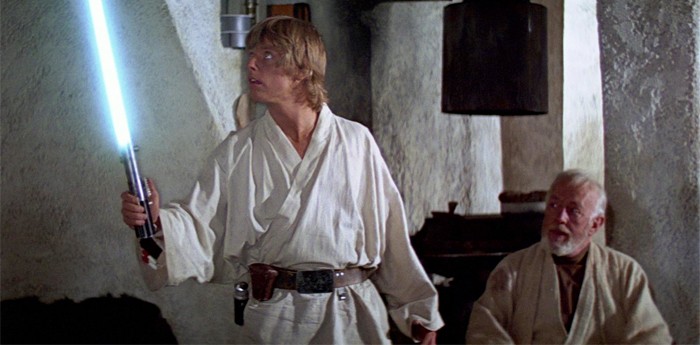J.J. Abrams Promises There Is No Talk Of Midi-Chlorians In 'Star Wars: The Force Awakens'
If you've been paying attention to the marketing and hype surrounding Star Wars: The Force Awakens, then you know that Lucasfilm, including president Kathleen Kennedy, and director J.J. Abrams have been touting a return to form for Episode VII, including making sure that you know there are much more practical effects in this new film than there were in the prequels.
And now there's one more guarantee that Abrams has made regarding one of the more hated parts of the prequel trilogy: midi-chlorians. J.J. Abrams recently sat down for a series of yes or no questions about Star Wars, and he was asked about the microscopic life forms that exist inside the cells of living beings, as explained by Qui-Gon Jinn in Star Wars: The Phantom Menace. Thankfully, Abrams gave an answer that will please those who hate midi-chlorians.
Hit the jump to find out more about The Force Awakens midi-chlorians exclusion!
Here's the quick Q&A with J.J. Abrams from MTV (via ScreenRant):
This should be fantastic news for fans, even though it's a bummer that there's no continuity between The Force Awakens and the Star Wars Holiday special. In all seriousness though, midi-chlorians were one of the worst inventions in the Star Wars galaxy, cheapening the Force in that your strength in the mystical power could be determined and measured by how many of these little microscopic life forms you had in your body.
We can't make any guarantees, but we're pretty sure midi-chlorians will never be mentioned in the Star Wars movies ever again, which will jibe with the presentation of the Force from the original trilogy. StarWars.com ran through the impact and significance of midi-chlorians on the Star Wars galaxy a couple years ago, and they recalled this quote from George Lucas, explaining them further:
"I'm assuming that the midi-chlorians are a race that everybody knows about [in the world of Star Wars]. The way you interact and interface with this larger energy field [the Force] is through the midi-chlorians, which are sensitive to the energy. They are at the core of your life, which is the cell, the living cell. They are in a symbiotic relationship with the cell. And then, because they're all interconnected as one, they can communicate with the larger Force field. That's how you deal with the Force."
While the midi-chlorians were a creation of the prequel trilogy, they did jibe with the idea that the Force is hereditary, something that was assumed after Luke Skywalker said "The Force is strong in my family," in Return of the Jedi.
However, the idea that strength in the Force can be passed on didn't preclude the idea that anyone could use the Force, anyone could become a Jedi or a Sith, and that seemed to be the biggest problem with midi-chlorians, and it seemed to directly contradict what was revealed by Lucas in a conversation with Lawrence Kasdan and Richard Marquand before they started shooting Return of the Jedi:
Kasdan: The Force was available to anyone who could hook into it?
Lucas: Yes, everybody can do it.Kasdan: Not just the Jedi?Lucas: It's just the Jedi who take the time to do it.Marquand: They use it as a technique.Lucas: Like Yoga. If you want to take the time to do it, you can do it; but the ones that really want to do it are the ones who are into that kind of thing. Also like karate.
And when you consider the fact that Luke didn't need to have a blood test run on him in order to determine if he was strong enough to follow Obi-Wan Kenobi on his mission, that makes the introduction of midi-chlorians unnecessary. Though one could argue that Kenobi didn't need to test Luke because he knew he was the son of Anakin Skywalker, and therefore it was likely that he was destined to have strength in the Force anyway.
Despite how much we hate midi-chlorians, the reality might be that they don't really change much. Lucas has said:
"Midi-chlorians are like a single entity: meaning each one doesn't think individually and have a life to itself; they think as a unit because there's so many of them and they're everywhere. They're in every single cell. And sometimes there's more than one in a cell. Sometimes there's a whole bunch in a cell. But there has to be at least one in a cell, otherwise the cell can't reproduce. All cells. Plant cells. Every life form has a midi-chlorian living inside of them."
So everyone in the Star Wars universe has midi-chlorians, almost like bacteria, but it's those who take the time to communicate with them to use the Force that are able to harness the potential power. So while someone may have a high midi-chlorian count, that doesn't mean they just have the ability of a Jedi or Sith. They still have to train and hone their power. So they don't really change anything, but we're also fine never mentioning them again.
Yes, we know this is a pretty in-depth discussion about something in a fictional world, but Star Wars has such a rich mythology that how it's structured, even down to these microscopic organisms, means a lot to hardcore fans. So surely they're thankful to J.J. Abrams to ignoring midi-chlorians in Star Wars: The Force Awakens.
Does the exclusion of midi-chlorians in Star Wars: The Force Awakens please you?

